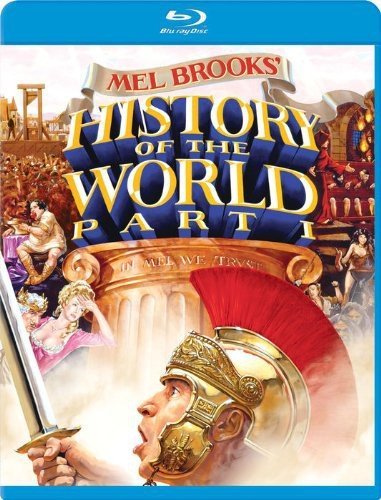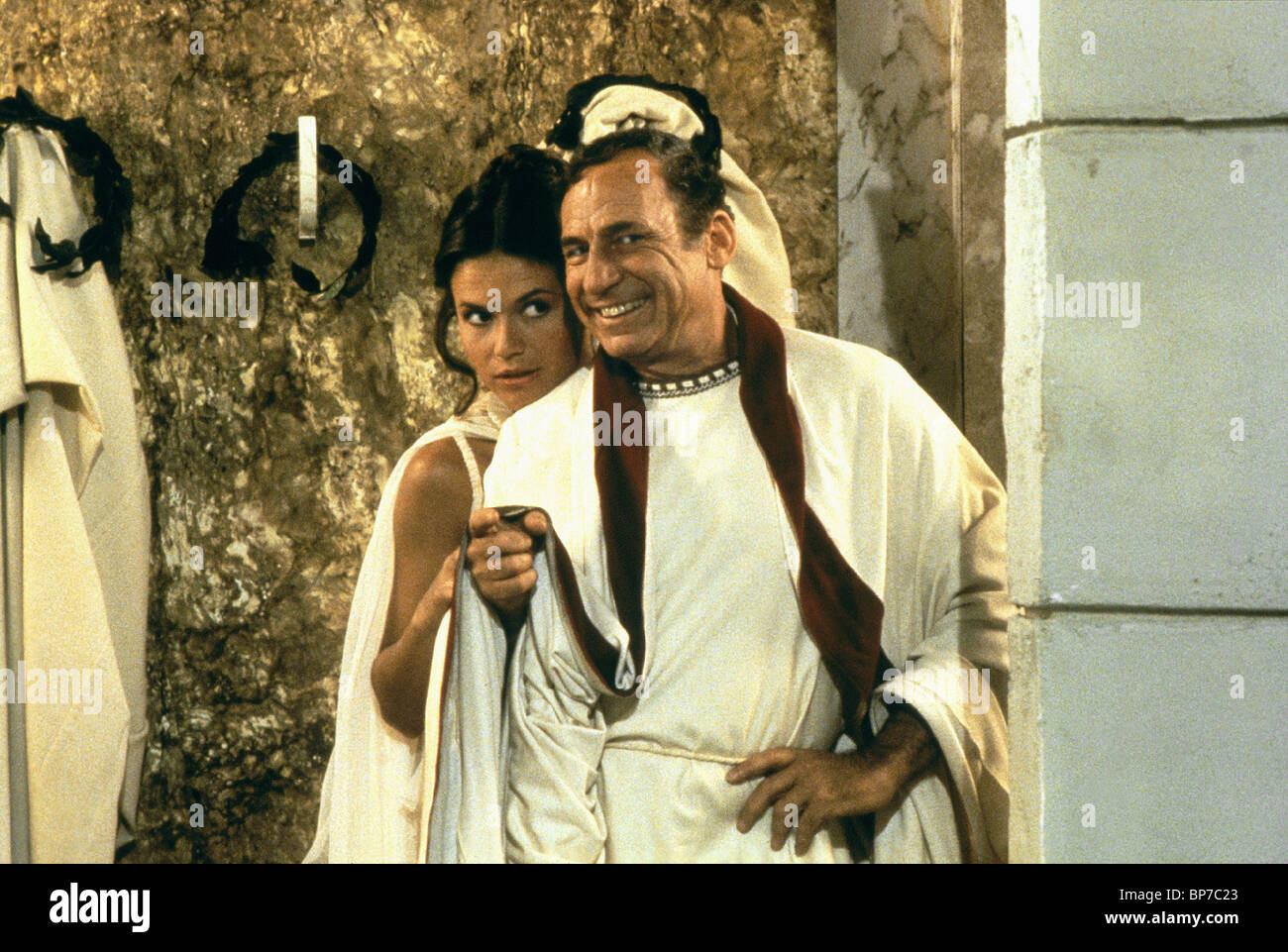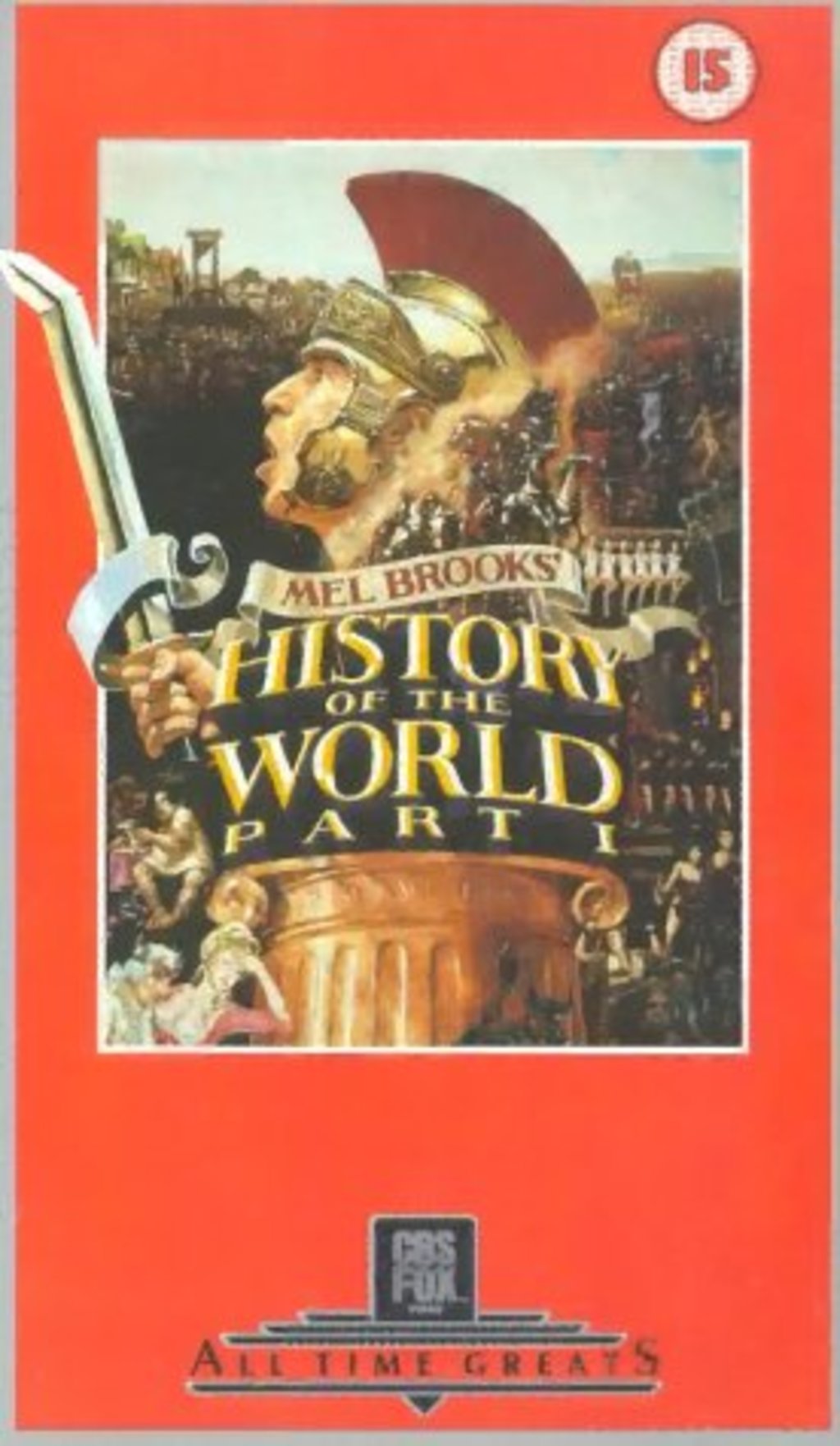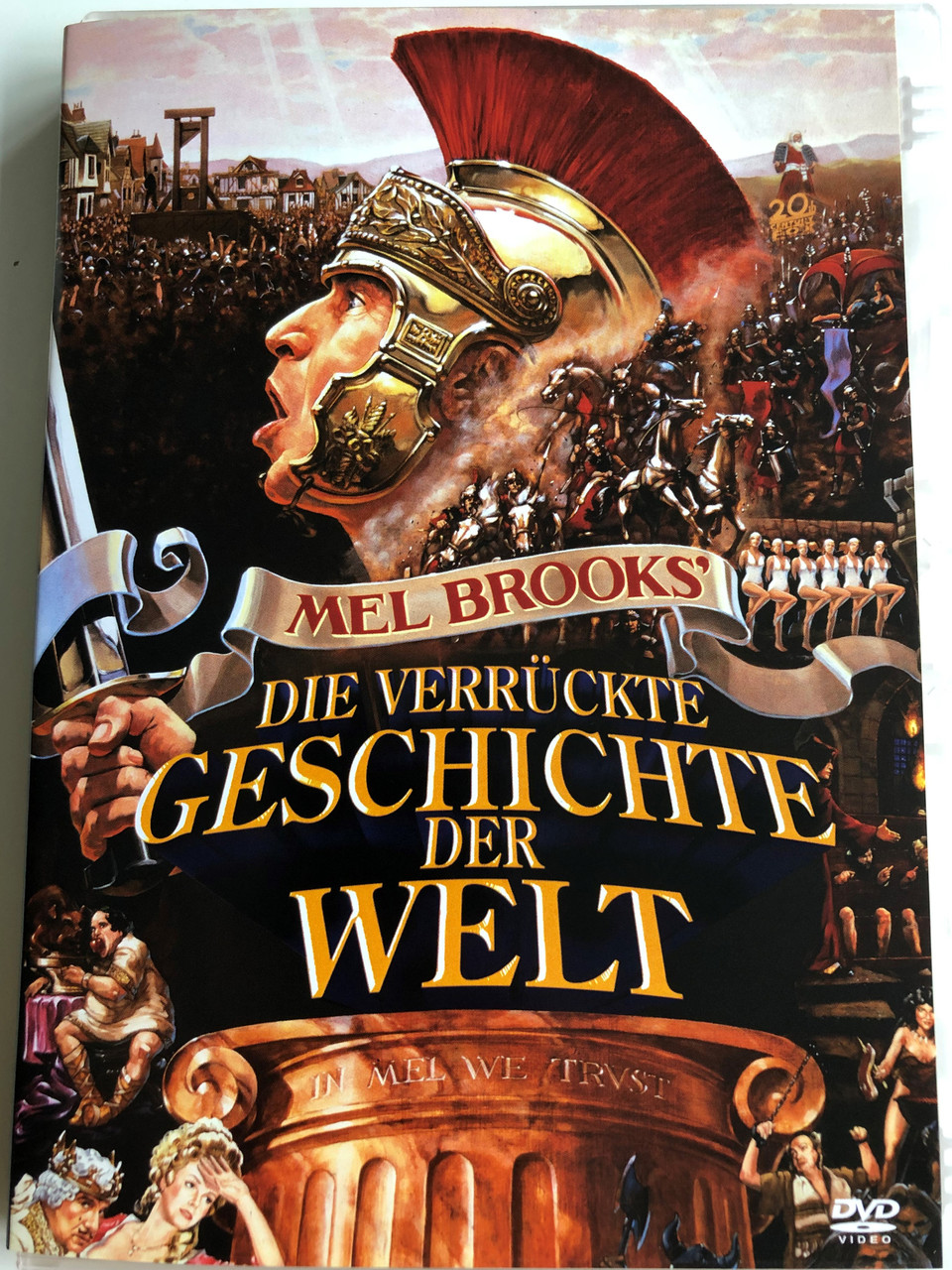History of the World, Part I is a 1981 film that provides a history of mankind covering events from the Old Testament to the French Revolution in a series of episodic comedy vignettes. Mel Brooks brings his one-of-a-kind comic touch to the history of mankind covering events from the Old Testament to the French Revolution in a series of episodic comedy vignettes. Those are among mine as well, since they contain some of Brooks' most cheerfully vulgar gags. Brooks has never been one to shy away from vulgarity — once famously bragging that his films rise "below vulgarity" — and this perhaps partially explains "Part One"'slukewarm critical reception at the time it was released.
First, even when it isn't making a larger point, it is often quite funny. Brooks' big song-and-dance number about the Spanish Inquisition, for instance, holds up as hysterically tasteless in the tradition of Brooks' "Springtime for Hitler" in "The Producers" even if it doesn't have much depth. Yet some of the crass jokes educate you even as you chuckle. Take the wordplay that uses a 12-letter epithet to reference Oedipus, a character from Greek mythology; if you know the classics, you'll get the joke. There are loads of familiarly funny gags in the film, which opens today at the Sutton, the Criterion Center and the 34th Street East and other theaters.
But the movie is so sour that its humor is often undermined, because so many of the jokes are either mean-spirited or scatological, or both. Women are either explicitly predatory or stupidly decorative, and homosexuals are made fun of regularly. Flamboyantly bad taste, which Mr. Brooks raised to the level of supreme wit in his ''Springtime for Hitler'' number in ''The Producers,'' is this time just bad. A musical number about the Spanish Inquisition, with Mr. Brooks playing a torturer who merrily abuses Jews, is about as crashingly unfunny as a musical number can be.
In general, Brooks' films aren't exactly noted for their political correctness—after all, the director's very first film was about an Adolf Hitler musical. Still, even he wondered if the breakout song in History of the World had finally crossed a line. "I don't know how audiences are going to react to the Spanish Inquisition sequence," Brooks told Mademoiselle. As he put it, trying to get a laugh out of any scene that involved "Jews on racks" could be "very dangerous." In the end, history repeated itself. After The Producers was released, Jewish leaders contacted Brooks en masse with complaints about the film's brazen Nazi gags. Thanks to that big inquisition number, History of the World, Part 1 garnered a similar reaction.
"I got a lot of write-ins from rabbis," Brooks admitted. Sid Caesar is a hapless caveman who bumblingly tries art, music, and invention. During the Roman Empire, Brooks himself is a "stand-up philosopher" named Comicus, who ends up playing a significant role in the Last Supper. During the French Revolution Brooks reappears in dual roles, as the spoiled, lust-driven King Louis XVI, who escapes the guillotine by switching places with a mild-mannered, lookalike urine-bucket servant. Gag coming attractions of the (never-made) History of the World, Part 2 include a skating "Hitler on Ice" and "Jews in Space." Surprise celebrity appearances throughout include John Hurt , Jackie Mason, Bea Arthur, and Hugh Hefner. Perhaps the most important comedy element of "History of the World" is that it doesn't have a linear story.
It is a series of sketches covering the Stone Age, the Old Testament, the Roman Empire, the Spanish Inquisition and the French Revolution, closing with a mock teaser trailer for the nonexistent sequel. Consequently, like the similarly intellectual sketch comedy film "Monty Python's The Meaning of Life" , "History of the World" is freed from all narrative constraints and able to tackle its subject on a more ambitious conceptual level. While "The Meaning of Life" is about philosophy, however, "History of the World" is about history. Brooks casts his comedic eye at humanity's past and, if the sketches are any evidence, seems to view our story as one of big guys keeping little guys down. The same thing goes wrong with Brooks's big production number in this movie, "The Inquisition," featuring a song-and-dance team of medieval monks, and a chorus line of nuns who splash in a pool, Busby Berkeley-style.
We're supposed to laugh at the shocking juxtaposition of religious images and Hollywood corn. But Brooks never gives us an additional comic level, one where he's making funny points about the images. When he dresses up like a monk and then dances like Donald O'Connor, that's only funny for a second. If we knew anything about the monk as a comic character, the scene could build. This movie is one of the cleverest and truly funny films that Mel Books as produced and stared in.If you like subtile or just plain old vaudeville comedy check this film out.
On June 12, 1981—35 years ago today—Mel Brooks's irreverent take on the course of human events opened in theaters. Though critics were thoroughly divided, History of the World, Part 1 grossed a respectable $31.6 million at the box office, and left countless viewers hungry for a sequel. These 11 footnotes should get you ready for a 35th anniversary screening. The film opened in 484 theatres the same weekend as Raiders of the Lost Ark and Clash of the Titans and finished fourth for the weekend with a gross of $4.8 million, behind Raiders, Clash and Cheech and Chong's Nice Dreams. With a per-screen average of $10,000, it was Brooks' highest opening on a per-screen basis.
Despite the strong start, poor word of mouth impacted its box office. Although it grossed $31.7 million, it was considered a commercial disappointment because the film had been "tracking" well and Brooks' previous films had been so successful. Danielle Solzman is native of Louisville, KY, and holds a BA in Public Relations from Northern Kentucky University and a MA in Media Communications from Webster University.
She roots for her beloved Kentucky Wildcats, St. Louis Cardinals, Indianapolis Colts, and Boston Celtics. Living less than a mile away from Wrigley Field in Chicago, she is an active reader (sports/entertainment/history/biographies/select fiction) and involved with the Chicago improv scene. She has previously written for Redbird Rants, Wildcat Blue Nation, and Hidden Remote/Flicksided.
From April 2016 through May 2017, her film reviews can be found on Creators. With Comicus bombing in jokes, things take a turn for the unexpected. Miriam comes to his rescue as Marcus Vindictus leads the Romans in a search.
Things happen and Comicus escapes to Judea, where he finds himself at the scene of The Last Supper. Where there's an opportunity for a gag, Brooks takes complete advantage of it. From a production standpoint this is one of the more impressive Mel Brooks pictures, lots of those gorgeous matte paintings that would come up later in Spaceballs, and big set-pieces like the "Spanish Inquisition" musical number.
Comedically, though, this is Mel's "drunk dad" period, and while it's often very funny, it also feels a little too mean-spirited in parts. Probably not any more offensive than Blazing Saddles on paper, but where that movie had a very sturdy satirical framework for most of its vulgarity, this feels more like spitballs. Dad comedy legends like Jackie Mason and Henny Youngman get cameos, just in case there was any doubt on this point. Delivery times may vary, especially during peak periods. Part of the problem with ''History of the World - Part I'' is that it's tired, so tired that the cheerful outrageousness of Mr. Brooks's earlier films has become waxen. The jokes often recall ''The Producers'' and particularly ''Blazing Saddles,'' but never are they as bold as they were the first time around.
The enormous cast includes some of Mr. Brooks's most resourceful comic sidekicks, among them Madeline Kahn, Cloris Leachman and the indefatigable Harvey Korman. MEL BROOKS'S ''History of the World - Part I'' shows its stripes right from the opening scene. In this Dawn of Man episode, apelike creatures rise up from the mud, learning to stand erect and reaching nobly toward the heavens. Then they begin bumping, grinding, rutting, gyrating and otherwise slipping back to the slime from whence they came. The movie, like these primitives, delights in being lowdown.
Even by prehistoric standards, Mr. Brooks's latest comedy is especially crude. Jazz on the Screen is a reference work of filmographic information and does not point to digitized versions of the items described. The Library of Congress may or may not own a copy of a particular film or video. Josephus, a quick-witted Ethiopian slave, is a principal character in the film's Roman Empire segment. Richard Pryor seemed perfect for the part and, to Brooks's delight, he accepted the role. Unfortunately, though, a terrible accident kept him out of the movie.
On June 9, 1980, less than a month after History of the World began production, the comic lit himself ablaze while freebasing cocaine and had to be hospitalized. At the suggestion of Madeline Kahn , Brooks handed the role to tap dancer Gregory Hines. There also is nothing inherently funny about Jews, Catholics, nuns, blacks, and gays. They can all conceivably provide the makings of comedy, of course, but in "History of the World" Brooks doesn't have the patience to introduce a character and then create a comic situation about him. He introduces the character and expects us to laugh at the character himself.
Instead of developing a comic situation around Orthodox Jews, he simply shows us some, complete with beards and hats, their heads stuck through a stockade, and expects us to laugh. But while we might laugh with Brooks at a comic situation, we have no reason to laugh at people just because of their appearance or religion. Brooks seems to rely on his own spontaneous comic genius in this film, and genius, even when you have it, is not something to be relied upon. He provides isolated moments that are indeed hilarious, moments that find an inspired image and zing us with it .
But as the movie creeps on, we realize that the inspirations are going to be rare, and that Brooks has not bothered to create a framework for the movie or to people it with characters. According to Mel Brooks, the Moses scene was a last minute addition. "Sometimes, you will get very lucky, and the set will give you ideas for jokes", Brooks said in a 2012 interview with the Directors Guild of America. One day, he was gazing out at the scenery that had been built for the caveman segments, when the gears in his head started turning. "I immediately thought, 'Well, where do I go from here?'" Brooks recalled. Heading into the shoot, his plan was to "skip the Bible and go to Rome." But eventually, he realized that the Stone Age set might enable him to explore another chapter in world history.
With a few minor alterations, Brooks converted his fake caves into a mountaintop, and the Moses bit was born. Long before Marvel, DC, or other blockbuster franchise films gave us the tag scenes, Brooks offers some coming attractions for History of the World, Part II. Notable among them is Jews in Space. He became very upset, adamant that he had seen Part 2 before.
I showed him our database of movies we could order, no Part 2. I showed him a Leonard Martin movie encyclopedia, no Part 2. He yelled at me and my manager for a while, the finale being "I'm going to Blockbuster!" I told him good luck. I remember when I was in middle school and was on a Mel Brooks movie kick.
I went to Blockbuster to rent History of the World Part I but I wanted part II as well so I could watch them both at the same time. This seller offers shipping discounts when you purchase two or more eligible items using the cart. Mel Brooks, the writer, director and producer of History of the World, is an ecologically sound filmmaker, a staunch adherent of recycling. If you laugh the second or third time, you defend the repetition as a variation on a theme; if you don't laugh, the charges are self-plagiarism and lack of imagination.
Mr. Brooks himself is both the movie's steadiest screen presence and its worst behind-the-scenes enemy. There's almost no routine here that couldn't have been made funnier with a few deletions. But Mr. Brooks is writer, producer and director, as well as star.
There are dozens of cameo performances, many of which are hard to spot. Mr. Brooks's direction is so messy it seldom calls attention to the natural highlights of any given scene. The movie begins as a series of brisk blackout sketches featuring Sid Caesar as a caveman, but it never again resumes the blackout format.
And it doesn't have the kind of hilarity that might justify the erratic format. You'll keep moving up the wait list, but the title won't become available to you while it's suspended. You can suspend your hold indefinitely , or for a set period of time. For "The Spanish Inquisition" segment, Brooks is featured as Torquemada, who enjoys torturing Jews who refuse to become Christians. The whole shtick is rendered as a Busby Berkeley set piece replete with music, singing, and a water ballet.
A sidetrip explains everything you always wanted to know about how Leonardo Da Vinci painted the Last Supper. Along with Woody Allen, Mel Brooks has helped sustain the comedy genre in contemporary films. As Allen has turned more serious, Brooks has gotten more outrageous.
He is the sole proprietor of vaudevillian yuks built around sexuality, scatology, and religion. His elemental energies are unleashed in spades with the release of History of the World — Part I. Brooks panders to the public's continual demand for the kind of bad taste humor that made burlesque popular in its heyday. The Library of Congress is providing access to these materials for educational and research purposes and makes no warranty with regard to their use for other purposes.
With a title like History of the World, Part 1, you'd assume that a Part 2 would be hot on its heels. But Brooks has stated that he never intended to make a sequel. On June 7, 1981—just four days before the movie opened in theaters, the director weighed in on this subject in The New York Times. " he asked, rhetorically. "No. Maybe a Part 4, never a Part 2." Brooks himself claimed that History of the World's budget—an estimated $11 million—exceeded that of his previous three films combined.
Particularly expensive was the Inquisition scene, in which the set alone cost $1 million. By comparison, the entire budget of 1968's The Producers was a paltry $941,000. "Sometimes, you will get very lucky and the set will give you ideas for jokes," Brooks said in a 2012 interview with the Directors Guild of America. One day, he was gazing out at the scenery that had been built for the caveman segments in History of the World when the gears in his head started turning.
"I immediately thought, 'Well, where do I go from here? Heading into the shoot, his plan was to "skip the Bible and go to Rome.'" But eventually, he realized that the Stone Age set might enable him to explore another chapter in world history. With a few minor alterations, Brooks converted his faux caves into a mountaintop, and the Moses bit was born. Twenty-two years after Your Show of Shows ended its run, Brooks expressed his gratitude to Caesar by giving him a major role in 1976's Silent Movie. Brooks would cast the comic again in History of the World, this time as Chief Caveman, who has a zeal for music .
Clean jokes and tasteless gags bump around in equal measure (if the PG-13 had existed in 1981, this could have dodged the R), sometimes funny, sometimes not. The French Revolution segment, pretty much the third act, is the weakest. Mel Brooks's movie "History of the World, Part 1" is a rambling, undisciplined, sometimes embarrassing failure from one of the most gifted comic filmmakers around. Brooks never seems to have a clear idea of the rationale of his movie, so there's no confident narrative impetus to carry it along. His "history" framework doesn't have an approach or point of view; it's basically just a laundry-line for whatever gags he can hang on it.


























